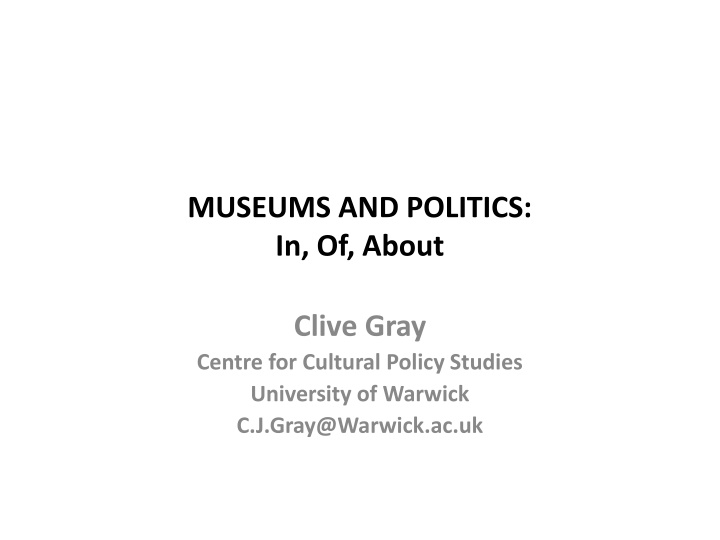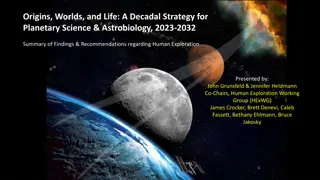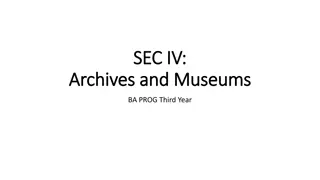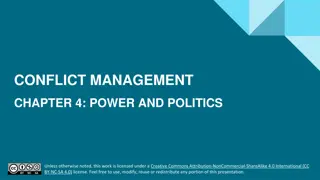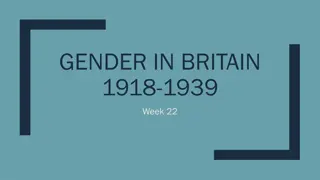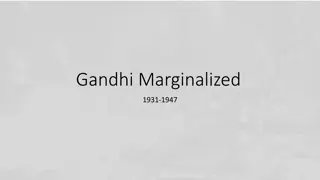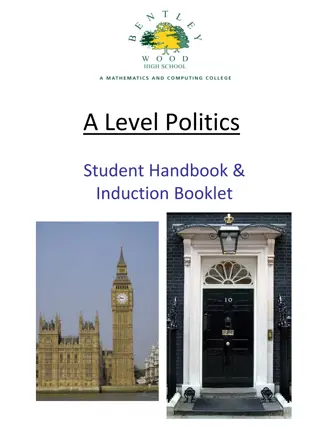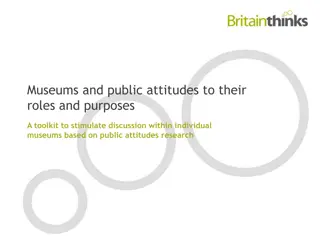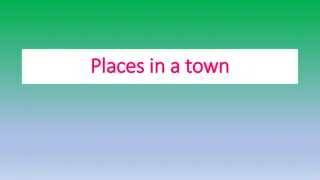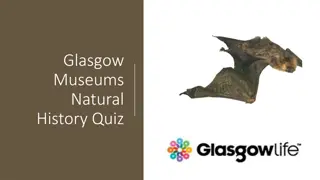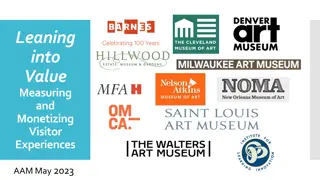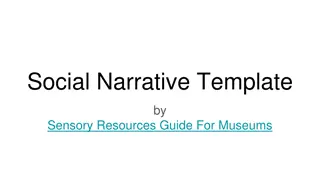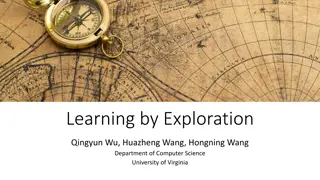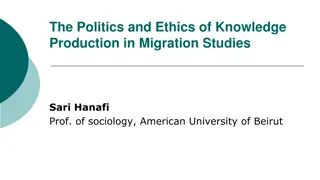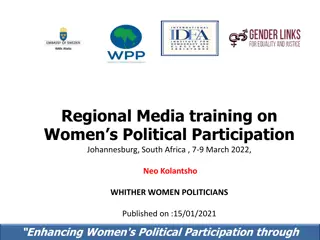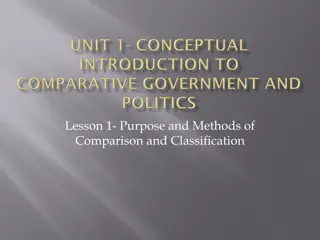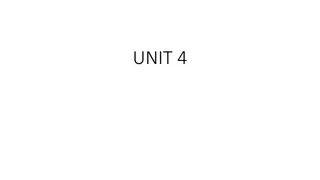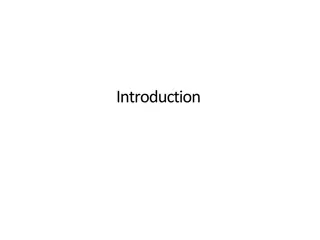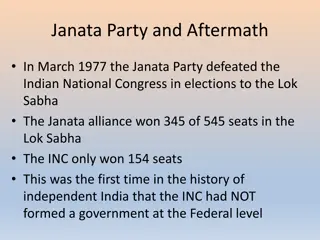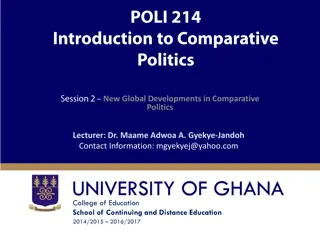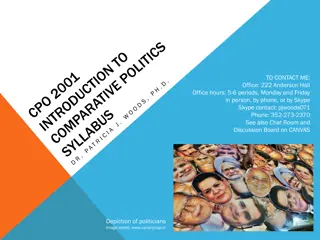Politics in Museums: A Comprehensive Exploration
Delve into the realm where museums and politics intersect, examining the dynamics of power, ideology, legitimacy, and rationality. Discover how politics operates within museums, addressing who the key actors are, the subjects of engagement, societal interest levels, and the specific arenas where decisions are made. Unpack the nested games of politics in, of, and about museums, exploring how actions, decisions, and contexts shape the museum landscape.
Download Presentation

Please find below an Image/Link to download the presentation.
The content on the website is provided AS IS for your information and personal use only. It may not be sold, licensed, or shared on other websites without obtaining consent from the author.If you encounter any issues during the download, it is possible that the publisher has removed the file from their server.
You are allowed to download the files provided on this website for personal or commercial use, subject to the condition that they are used lawfully. All files are the property of their respective owners.
The content on the website is provided AS IS for your information and personal use only. It may not be sold, licensed, or shared on other websites without obtaining consent from the author.
E N D
Presentation Transcript
MUSEUMS AND POLITICS: In, Of, About Clive Gray Centre for Cultural Policy Studies University of Warwick C.J.Gray@Warwick.ac.uk
POLITICS Politics is concerned with the inter-action of: 1. Power - positive/negative: getting things done; stopping things happening; managing the agenda 2. Ideology - patterns of values, norms and beliefs that establish the context within which power is exercised 3. Legitimacy - the established acceptance that power has been exercised appropriately, and that the outcomes of this exercise are the right ones given the rules of the game 4. Rationality the underlying logical framework which justifies the legitimacy of the system: legal, social, economic, behavioural, ritual, instrumental, political, museal
HOW DOES POLITICS WORK? Well It depends. And it depends upon: 1. The Actors who are taking part: core; penumbral; peripheral; policy-relevant; disengaged/excluded/potential 2. The Subject of engagement: issues of entry fees are not subject to the same politics as are issues of restitution/reclamation/repatriation 3. The Degree of societal interest: who cares? 4. The Arena in which it occurs: the museum ; local; regional; national; international Now let me make some gross generalisations
POLITICS IN, OF, ABOUT Something of a series of nested games Politics in museums: how are things done? - undertaken primarily by those who directly run museums and provide museum services Politics of museums: what things are done? - undertaken by those inside and outside the museum whose decisions affect the context for what takes place in museums Politics about museums: why are things being done? - undertaken by those inside and outside the museum whose decisions set the contexts for the politics of museums
POLITICS IN: I 1. Actors: core and penumbral - professionals; managers; ancillary staff; volunteers 2. Subject: the collection - exhibition and display; engagement; functional provision (education; conservation; curation; catering - particularly of cakes; security; etc) 3. Degree of interest: local ; visitors; community (however defined - for New Walk it is not the same as for the British Museum): often high for specific cases but generally low 4. Arena: the museum
POLITICS IN: II 1. Power - primarily positive : making explicit choices 2. Ideology - primarily professional based on functional concerns 3. Legitimacy - primarily deriving from professional expertise; secondarily deriving from bureaucratic rules, norms and legal-rational values 4. Rationality primarily museal; secondarily behavioural, instrumental and social
POLITICS OF: I 1. Actors: core , penumbral , peripheral , policy-relevant 2. Subject: accountability; funding between functions; visitors/engagement; the collection (in terms of, for example, accessioning/deaccessioning) 3. Degree of interest: context dependent - largely not particularly high except amongst those with a central interest in the subject as employees, visitors and potential visitors, or as funders and general managers 4. Arena: the museum and sectoral, local, regional, national
POLITICS OF: II Power: positive and negative: making decisions/policies; managing the agenda to control access to the system Ideology: combination of professional (about management) and (usually) party political (about choices) values and beliefs Legitimacy: primarily procedural rules; secondarily legal norms and political system values Rationality: subject dependent - political (eg accountability); social (eg visitors/engagement); economic (eg funding choices); instrumental (eg. accessioning/deaccessioning)
POLITICS ABOUT: I Actors: primarily core ; secondarily policy-relevant and peripheral Subject: definitional; rules of engagement and best practice ; national status and centrality ( bragging rights ) Degree of interest: self-contained and self-referential; primarily core professional; secondarily national governmental Arena: primarily international (eg ICOM, UNESCO); secondarily national (eg professional associations)
POLITICS ABOUT: II Power: largely negative - controlling access to the system; controlling core ideological and professional positions that exclude non-believers Ideology: primarily professional Legitimacy: primarily developed from professional authority and rules; secondarily from political norms and values Rationality: primarily museal and ritual; secondarily political and social
